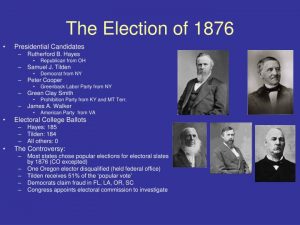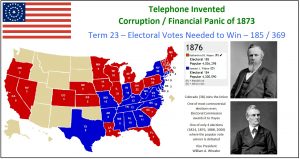Will 2020 be a Reprise of the 1876 Presidential Election?
What a question, you might ask. But let’s look at what happened in 1876 and then you can make up your mind.
The similarities between 1876 to 2020 are striking.
Let’s set the scene.
In 1876 the Democrats controlled the House. The Republicans controlled the Senate. The nation was in political and economic crisis, still staggering from the disastrous Panic of 1873.
Ulysses S. Grant was the incumbent Republican president, but at the last minute, he decided not to run for a third term. Of course, the scenario is different today. Donald Trump is running for a second term, not a third term.
(Historical Note: From George Washington until Harry S Truman, presidents could serve as many terms as they could win. President Franklin D. Roosevelt won four consecutive terms between 1932 and 1944. On Feb. 27, 1951, the 22nd Amendment was ratified which established a two-term limit for presidents.)
So, with Grant out of the picture, the Republican who did run in 1876 was a dark horse candidate named Rutherford B. Hayes. His Democrat challenger in the intensely disputed election was New York, Gov. Samuel Tilden.
Tilden was widely expected to win the general election against the little-known Hayes, who was a Civil War hero and Ohio governor.
Now here is where things get interesting. There are some political pundits today who say the 2020 election could play out in similar fashion to the 1876 election.
Just how might that happen? Let’s look back at the 1876 election.
When Election Day came, neither candidate had a majority of the electoral votes. Tilden had easily won the popular vote, but he needed one more electoral vote.
However, in four states, each party claimed that their candidate had won the state, which obviously could not be true. If the Democratic reports of the election were accepted, Tilden would be the President. If the Republican reports were accepted, Hayes would be the President.
The Constitution didn’t account for this scenario: There was no provision for settling a dispute involving rival electors. An additional problem was that the Vice President needed to certify the election. But Vice-President Henry Wilson had died a year earlier, and there was no sitting Vice President.
A special Electoral Commission of Senators, House members, and Supreme Court justices was appointed by Congress to settle the dispute and avert a constitutional crisis before March when a new president was supposed to take office.
The commission awarded all of the electoral votes of the four disputed states to Hayes in an 8-7 vote. The Democrats allegedly agreed to the decision in exchange for the withdrawal of federal troops from South Carolina and Louisiana, marking the end of Reconstruction in the South, in what is called the Compromise of 1877.
That’s quite a legacy for Hayes, who essentially slinked into the White House via a backroom deal.
The second part of Hayes’ legacy was the fallout from Reconstruction’s end and the subsequent enactment of Jim Crow laws by Democrats that mandated racial segregation in the South and disenfranchise black voters. Under terms of the deal, Hayes removed the last federal troops from the South, and the rest, as they say, is history. Rather than the reconstruction of the south that ensured political and social equality for former slaves, the South entered a period of Jim Crow laws that didn’t end until the Civil Rights movement of the 1960s.
Now, here’s another similarity between 1876 and 2020. After his controversial election, Hayes promised not to run for re-election.
Does THAT sound familiar? If Biden beats Trump, he has promised to be a one-term president—that is, if he lasts through his first term.
I can hear Kamala Harris licking her political chops now.
Hayes kept his promise to be a one-term president and that helped restore the nation’s faith in the office of the presidency. During his time in office Hayes also attacked run-away patronage in the nation’s corrupt civil service system and triggered the recovery of the American economy.
Nevertheless, the results of the 1876 election remain among the most disputed ever.
Today, with the controversy over the mass-mailing of ballots to voters and the potential of voter fraud, you have to wonder that lies ahead after November 3.
Will the 2020 Presidential election come off without a hitch?
Or will we experience, as baseball Hall of Famer Yogi Berra once declared, “Déjà vu all over again?”



